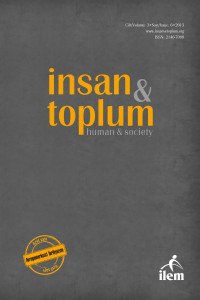Abstract
Bu yazıda, Avrupamerkezli tarih anlatılarının nasıl bir susturma, yok sayma mekanizması olduğunu anlatılıyor. Fransız Devrimi’nden Haiti’deki plantasyonlara, Avrupalı felsefecilerin sömürgecilik karşısındaki tavırlarından Karl Marx’ın tarih anlayışına uzanan farklı güzergâhlar takip ediliyor. Birbiriyle alakasızmış gibi duran bütün bu hikâyelerin ortak noktası şu: Tarih, belirli bir öznenin etrafında, yani belirli bir failin yapıp-ettikleri olarak anlatıldığı müddetçe birtakım yerler, zamanlar ve insanlar, hikâyenin dipnotu olarak kalmaya mahkûm kalırlar. Varlıkları yoklukları ana hikâyeye etki etmez. Daha doğrusu, aynı hikâye bu diğer coğrafya ve insanlar olmasa da aynı şekilde anlatılabilir. Ancak, bu yazıda, sorunun sadece Avrupamerkezcilikten kaynaklanmadığı, tarihyazımının daha kapsamlı bir eleştirisine ihtiyaç duyduğumuz iddiası savunuluyor. Avrupamerkezciliğe getirilen pek çok eleştirinin de ister istemez benzer tuzaklara düştüğü, yani tarihi (Avrupa değilse de) yine bir merkez çevresinde konumlandırdığı gösteriliyor. Yazının temel gayesi, tarihin kayda değmeyen unsurları olarak es geçilen mekânlar/insanlar hakkında düşünmek; bu sayede Avrupa ve Avrupa tarihi gibi kavramları bir daha tartışmak.
References
- Arneil, B. (1996). John Locke and America: The defence of English colonialism. Oxford, England: Clarendon Press.
- Bello, W. (2009). In The food wars. London, & New York: Verso.
- Bhambra, G. K. (2007). Rethinking modernity: Postcolonialism and the sociological imagination.
- Basingstoke, New York: Palgrave Macmillan.
- Blaut, J. M. (1993). The colonizer’s model of the world: Geographical diffusionism and Eurocentric history. New York: Guilford Press.
- Buck-Morss, S. (Summer, 2000). Hegel and Haiti. Critical Inquiry, 26(4), 821-865.
- Chakrabarty, D. (2000). Provincializing Europe: Postcolonial thought and historical difference. Princeton, N.J.: Princeton University Press.
- Connell, R. (2007). Southern theory: The global dynamics of knowledge in social science. Cambridge, & Malden, MA: Polity.
- De Beauvoir, S. (1953). The second sex. New York: Knopf.
- Deleuze, G. (2004). Difference and repetition. London: Continuum.
- Dussel, E. D. (1995). The invention of the Americas: Eclipse of “the other” and the myth of modernity (Trans. M. D. Barber). New York: Continuum.
Abstract
This article analyses Eurocentric narratives and how they overlook (and silence) particular places and people. It covers a range of issues, starting from the Haitian plantations to the French Revolution; from the Enlightment philosophers’ ideas about colonialism to Marx’s understanding of how histories unfold. At first sight, these themes might seem unrelated, but they share an important aspect. As long as histories are told around particular subjects, that is, as the actions of those subjects, then other places, other times and other people will have to remain footnotes. They would not have an impact on the main story, or rather, the same stories can be told with or without them. In each theme, I look at the third degree actors and places which supposedly do not affect the dominant historical narratives. Yet, in this article, I argue that this problem does not only stem from Eurocentrism and that we need a more comprehensive examination of how we think of histories. I show that even the critical accounts of Eurocentrism repeat similar lines of thought, and that they often replace Europe with another centre. In order to challenge the boundaries of Europe, I will focus on and analyse those who are seen as outsiders (to European history) and ignored. I show that they are indeed part of the main story.
Keywords
Postcolonialism Orientalism Haitian Revolution Enlightment Slavery Historiography Marxism Provinciality
References
- Arneil, B. (1996). John Locke and America: The defence of English colonialism. Oxford, England: Clarendon Press.
- Bello, W. (2009). In The food wars. London, & New York: Verso.
- Bhambra, G. K. (2007). Rethinking modernity: Postcolonialism and the sociological imagination.
- Basingstoke, New York: Palgrave Macmillan.
- Blaut, J. M. (1993). The colonizer’s model of the world: Geographical diffusionism and Eurocentric history. New York: Guilford Press.
- Buck-Morss, S. (Summer, 2000). Hegel and Haiti. Critical Inquiry, 26(4), 821-865.
- Chakrabarty, D. (2000). Provincializing Europe: Postcolonial thought and historical difference. Princeton, N.J.: Princeton University Press.
- Connell, R. (2007). Southern theory: The global dynamics of knowledge in social science. Cambridge, & Malden, MA: Polity.
- De Beauvoir, S. (1953). The second sex. New York: Knopf.
- Deleuze, G. (2004). Difference and repetition. London: Continuum.
- Dussel, E. D. (1995). The invention of the Americas: Eclipse of “the other” and the myth of modernity (Trans. M. D. Barber). New York: Continuum.
Details
| Primary Language | Turkish |
|---|---|
| Subjects | Philosophy, Sociology |
| Journal Section | Research Articles |
| Authors | |
| Publication Date | December 1, 2013 |
| Published in Issue | Year 2013 Volume: 3 Issue: 6 |


